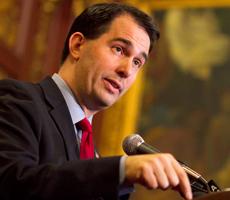Waiting for a survivor’s tale

The results of a referendum on whether to recall Gov. Scott Walker will say whether it’s possible for a politician to confront greedy government unions, to make the cuts in government services that the economists (and common sense) say are inevitable, and live to tell a survivor’s tale.
The governor, a Republican, angered labor bosses by eliminating the collective-bargaining rights of the government unions to bargain with the state – in effect, eliminating the right to sit on both sides of the table and bargain with themselves.
Mr. Walker and Tom Barrett, the Democratic mayor of Milwaukee, are on the ballot against each other in this unusual race. If Mr. Walker wins nothing changes. If Mr. Barrett wins he will be the new governor (and safe from a reprisal recall for a year). The latest polls make Mr. Walker a slight favorite to keep his job.
Nearly all the wiseheads in Washington, eager to translate a local race into something about the presidential campaign, argue that the prospects of both Barack Obama and Mitt Romney, if not the men themselves, are on the ballot, too. If Mr. Walker prevails and the recall fails, it’s more bad news for the president. The governor will become an overnight rock star for a Republican future.
Many of the wiseheads, including lots of reporters and pundits, have decamped to Milwaukee and Madison for the big night. The usual carnival barkers are here, too: the Rev. Jesse Jackson arrived in Milwaukee for a rally in a lawdy-how-gaudy two-car caravan, a Mercedes S550 for himself ($125,000 at a dealer near you) and a Cadillac Escalade ESV (only $80,000) for his fetchers and go-fers. Bill Clinton, just in from his smash appearance with stars of the porn epic, “Farm Girls Gone Bad,” in Monte Carlo, dropped in last week for a riverfront rally with plainer folk in Milwaukee to tell Cheeseheads that the recall is “about much more than the state of Wisconsin and what’s best for them.”
America is watching, he said, and the states recovering from the Obama recession have embraced something he calls “creative co-operation,” not the “constant conflict” that Mr. Walker delivered to Wisconsin with his elimination of collective bargaining for public employes.
Bubba is the nearest thing to the heavy hitter that Mr. Barrett and the Democrats yearned for, though his track record since his White House days in converting charisma to actual results is not good. President Obama, sensing more bad news after last week’s “horrible days of hell,” has been the notable no-show. He actually got within five miles of Wisconsin last week, but too bad for the Democrats he passed over, five miles above the battleground where he could lounge comfortably in Air Force One on his way to a rally in quieter, happier Minnesota.
The bang and clatter of politics has become as high-decibel elevator music in Wisconsin. “Protests. Lawsuits. Recalls. More lawsuits. More recalls,” complains the Madison State Journal. “Is this the ‘new normal’ for state politics?" In fact, yes. The governor is not even the only target of the recall. The Republican lieutenant governor and four Republican state senators, all paired against Democratic challengers, are also subject to recall. If the Democrats win only one of the state Senate seats they’ll regain the majority and the ability to obstruct the Walker agenda, presuming he wins.
Curiously, collective bargaining rights for government employes, the issue that ignited recall hysteria, has been all but forgotten over the weeks of campaigning. What enraged the union bosses is that the Walker reform legislation eliminated the requirement that the state collect union dues. Those dues of several hundred dollars a year are now voluntary, and once members of the American Federation of State, County and Municipal Employes looked at their new paychecks many of decided they didn’t need the union, after all. Membership fell from 63,000 to 29,000 in a single month.
Property taxes have declined since the reforms were enacted, private employers have added jobs and Mr. Walker estimates that that the re-negotiated labor contracts, including requiring employes to pay a fraction of their health-care costs for the first time, have saved school districts more than a billion dollars. Mr. Barrett and the Democrats prefer to talk about something else.
Wesley Pruden is editor emeritus of The Washington Times.

